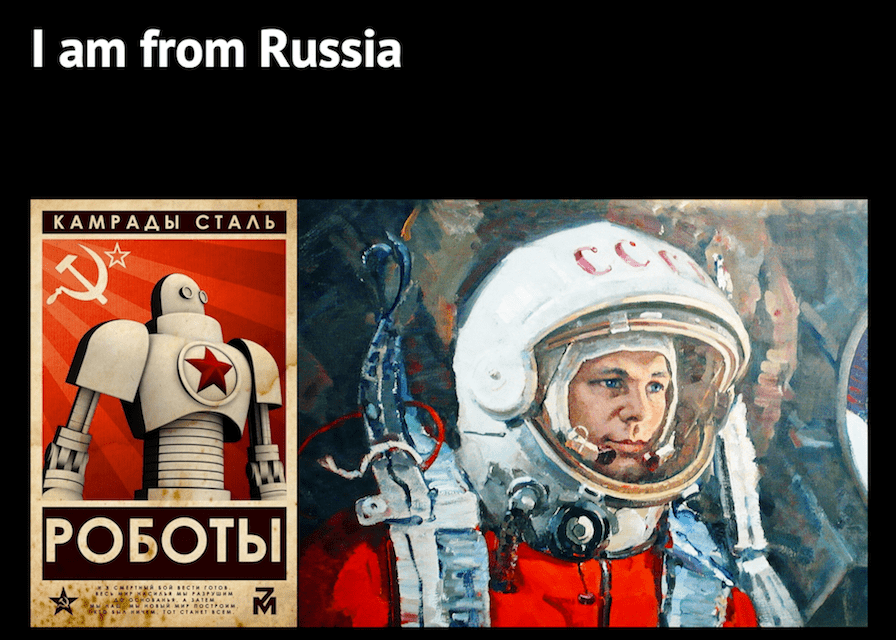Speaking with an accent

And getting over it. Read these tips from Andrey Sitnik, lead frontend developer at Evil Martians, creator of Autoprefixer and PostCSS, and learn how to get out of your comfort zone and on a major tech conference stage, even if your spoken English lags behind your programming skills.
Over the course of the last decade Andrey Sitnik, 30, spoke at dozens of conferences worldwide: from Tehran to New York. “Getting myself on a speakers list is my way of not paying an entry fee,” he jokes. In 2017 alone he went on stage at least nine times, presenting OSS projects of his own creation such as Autoprefixer, PostCSS, Logux, and Size Limit.
But anyone who heard him live will admit that his JavaScript is much better than his English.
Look at YouTube’s automatic closed captioning algorithm getting lost (hilariously) while trying to figure out the language of Andrey’s speech. It is English, but AI is so confused by the accent that it thinks Cyrillic is a better fit.

Andrey Sitnik at Frontend.fi conference in Helsinki (2015)
That talk at Frontend.fi conference in Helsinki was the first time Andrey spoke English on stage. If you come from a non-English-speaking country where you talk (and think) about your craft mostly in native language, imagining yourself in Andrey’s place might utterly terrify you.
However, according to Sitnik (and other globe-trotting Evil Martians), the lack of oral English skills should not be a reason to pass on international speaking engagements.
To help you feel better about your non-perfect English and to get ready for your first international conference as a speaker, Andrey shares some tips and observations that help him put his mind at ease before coming up on stage.
We hope they will help you too.
Queen’s English is not the king
When you speak at an international tech conference, your audience is international too. You may be certain that most of the people sitting in front of you were not raised on Queen’s (or Queens) English.
The total number of developers worldwide is often placed at around 20 million. The question “How many of them speak English as a first language?” does not have a definitive answer, though. While it is known that the United States, for instance, has one of the largest developer’s populations in the world (up to 4 million), it is also known that the majority of the technology workforce across largest IT hubs in the US is comprised of foreign-born specialists.
57% of Silicon Valley professionals were not born in the States.
So, while there is no easy way to tell how many developers worldwide are native English speakers, you can be certain they are not the majority.
According to Andrey, being a fluent English speaker with a perfect Received Pronunciation may prevent you from being understood by your audience. The KISS principle applies to language too.
English is a fantastic language: 850 core words are all you need to be fully understood in everyday life. If you read programming documentation on a daily basis (and you probably do), chances are you know way more than that.
Of course, knowing the words does not necessarily mean you can construct sentences out of them and pronounce those sentences correctly. Most probably, some of the technical terms sound off in your head: “URL” is probably “oorl” to you, not “you-err-el” if you are Russian; if you are French, it is likely that you refer to “hash” as “ush”.
That is why Andrey recommends relying on slides more than on speech to get your message across.
Let it slide
If English is not the “main language” of your average international tech conference, then what is? Code, of course! Whether it’s Ruby, JavaScript, Python or OCaml—you may be confident that every piece of code that you share will be understood by people who program in the same language.
Coming from the broadcasting background, a piece of advice I often heard is that a good television report should drive the point home even with the sound off. According to Andrey Sitnik, the same rule holds true for slide decks. So, while preparing your slides, assume that the audience will not understand a single word coming out of your mouth.
Yes, that goes against the common advice to use “more images, less text” in your presentation.
Andrey is certain that being explicit in slides and not treating them as a mere “backdrop” is your key to success if you are a non-native speaker: “It is safe to consider that those in front of you are just a small share of your total audience, as more people will discover your talk online. Don’t expect those who watch you on YouTube to follow your every word.”
If your slides are self-explanatory and anyone can understand them on fast-forward, you should not worry about your accent at all.
Here is a slide deck that Andrey had prepared for his talk on linters in China. You can get the whole message just by flipping through.

Make your slides as clear as possible
Another tip from Andrey: try to make sure that code examples you choose to show do not exceed ten lines each. Otherwise, you will make your audience uncomfortable.
Break the ice
The five-minute rule for deciding whether to keep information in memory or store it on disk works for public talks too: in the first five minutes, your listeners will determine if they should follow you further, or “flush the buffer” and turn their attention to a Twitter feed or emails.
There is no point in cutting to the chase (unless you deliver a 10-minute long lightning talk) right away—start by setting the mood.
“You are free to tell personal stories, make jokes, use memes or share cultural observations—anything that might help you synchronize with your audience,” says Andrey.

One of Andrey Sitnik’s elaborate opening slides
Take it slow
We will not walk you through the process of coming up with the idea for the talk or applying to a particular conference—as your mileage may vary depending on the field you are in. There are great websites outlining the whole deal, and Andrey highly recommends speaking.io. Provided you have already found your subject, here is how to gradually make yourself prepared for a big day on an international stage:
- Speak in front of your colleagues. Whether you have an office or work remotely, ask your coworkers to be your audience. In fact, this is how we prepare for conferences at Evil Martians: a “dress rehearsal” of the upcoming talk through Zoom.us or Hangouts is always in order. Your colleagues are the people you know, so speaking in front of them will make you less nervous, you will also probably take their comments better (and let’s hope your company has a good culture, so there will be a great deal of encouragement together with some valid criticism).
- Speak at local meetups in your native language. There is nothing wrong with running the same talk several times, starting with a meetup close to you and gradually moving on to bigger events. Going through local (city, agglomeration), regional (state, department) or national (capital) levels, you can master the flow of your presentation in a native language. According to Sitnik, it is entirely OK to spend 3-6 months polishing your performance; after that, you can travel with one well-prepared talk for up to a year.
- Travel to the closest country where English is not the official language. Sign up for an event in Poland, Belarus or one of the Baltic nations if you are Russian or Ukrainian, go to Vietnam if you are Chinese, the Netherlands if you are French—you get the idea. You will hear the variety on “non-native” English accents and realize that your accent is not a hindrance, but a way of expressing your personality and background.
- Finally, try your luck in an English-speaking country. United States, Great Britain, Canada, Australia—the world is your oyster. If you had a chance to run the same talk several times, there are fewer chances of having a panic attack. Sitnik remembers that once he was so terrified during a public talk, that he lost a sense of any English grammar and was almost enumerating words instead of stringing them together. But as his slides were well-structured—he still got positive feedback from the audience after the show.
Develop an ear
If you are not surrounded by English in your everyday life, you still need to find a way to soak in the sounds of the language. Each member of our team has their unique way to do it: some are obsessed with a particular musical genre and know words to songs (in English) by heart, some listen to podcasts on a daily basis, some prefer watching every technical talk they can find on YouTube. Andrey Sitnik has his technique: TV.
Streaming popular English or American series with subtitles on helps Andrey build the vocabulary and get used to “native” turns of phrase.
There is some science to it (in case you are blaming yourself for binge-watching like we do). In 2016, researchers from Barcelona decided to test an anecdotal evidence that citizens in countries like the Netherlands or Sweden are fluent in English because American or British shows are rarely dubbed on their local TV. In a paper called “Watching Subtitled Films Can Help Learning Foreign Languages”, they conclude that it is indeed possible to increase English levels by watching subtitled TV series. The results were better when episodes were shown with English subtitles.

That moment in “Stranger Things” when the character saves the world with some Basic
Thank you for reading! We hope we have convinced you to try your hand at public speaking at international tech conferences even if you have severe doubts about your accent. Let’s cross our paths somewhere!
As a bonus, here is an excellent list of frontend conferences recommended by Andrey Sitnik (he is a frontend developer, after all).

